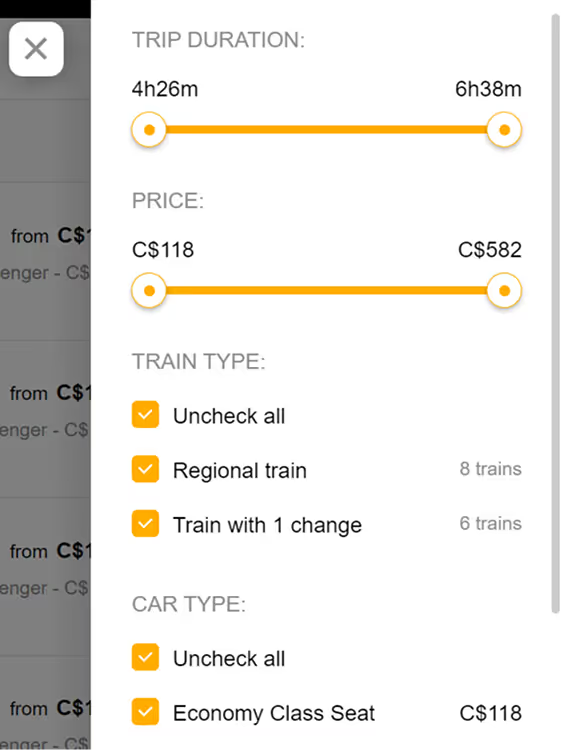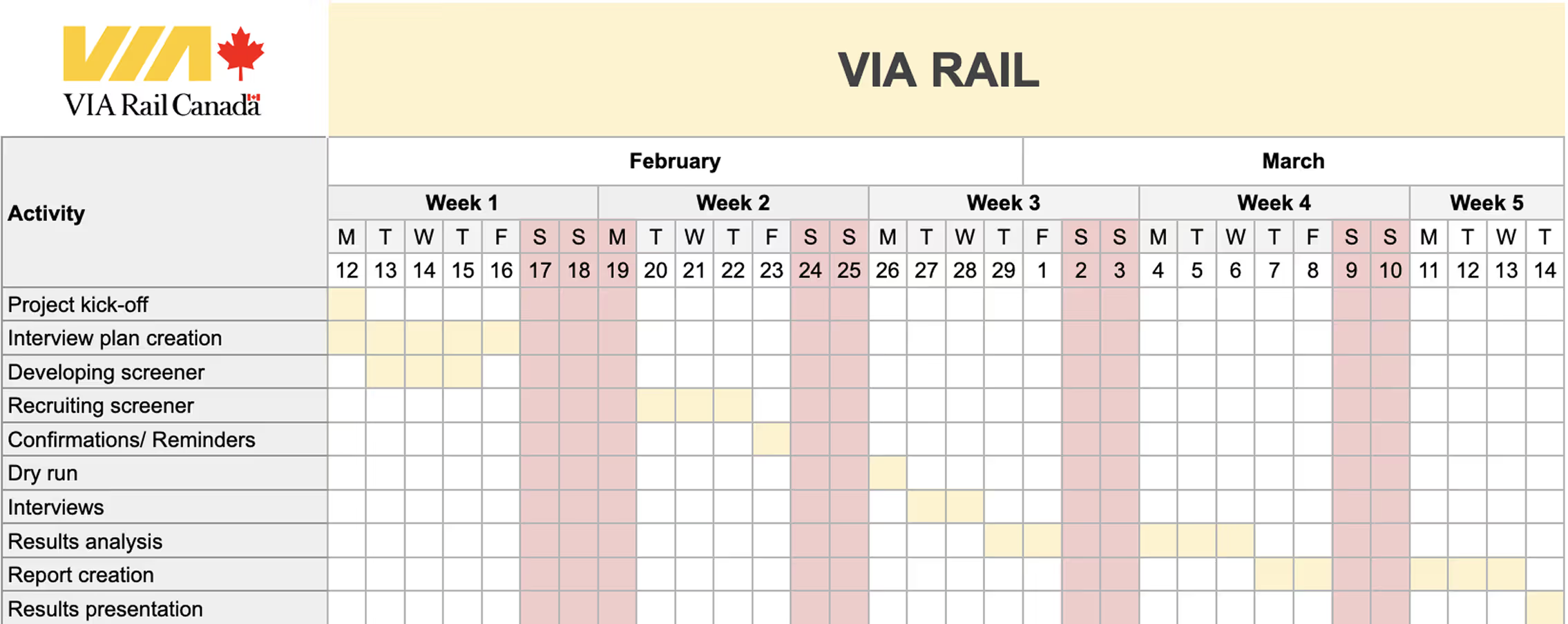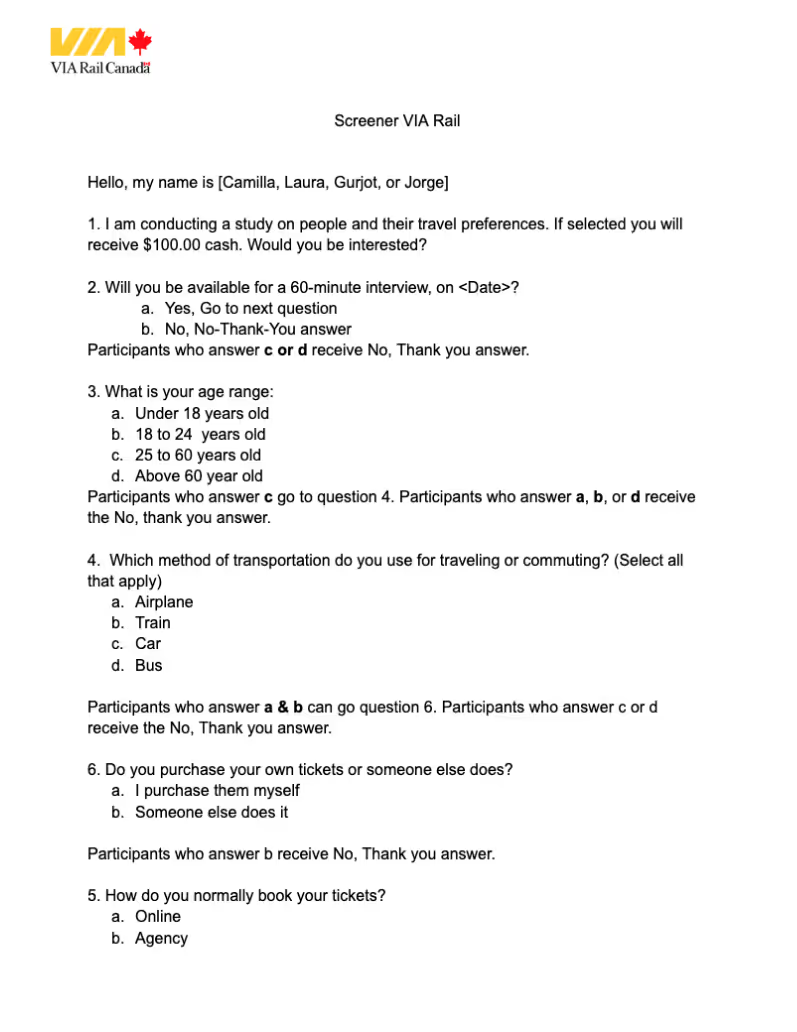Research Overview
We conducted a comprehensive study to enhance VIA Rail’s online experience. Using heuristic evaluations, competitive analysis, and user interviews, we identified and validated friction points in the booking process. I participated in all roles throughout this research, gaining insights into user behaviors and preferences. This research provides a clear roadmap for improving our website and ensuring a seamless, satisfying user experience
Team
Camilla Teodoro
Jorge Castellanos
Laura Medina & me
Jorge Castellanos
Laura Medina & me
Duration
4 months
Mentor
Yvonne Shek
Executive Summary
Our team conducted a research study to determine areas of opportunity in our purchase path. Here are our findings:
1.
Our users value a good bargain.
2.
Users seek information to make informed travelling decisions.
3.
Users wants a hassle free booking process.
4.
Users want the ability to modify their ticket details.
5.
Users want to be notified at every stage of their travel journey.
Competitive Analysis
We conducted a competitive analysis using the following methods for VIA Rail:
- Business Analysis
- Heuristic Evaluation
- Comparative Analysis
- SWOT Analysis
By applying these methods to VIA Rail we were able to highlight weak areas on the platform’s purchase path that affects the user’s flow and experience. The goal for this research is to understand the user’s behaviour and determine opportunities to improve our services.
- Business Analysis
- Heuristic Evaluation
- Comparative Analysis
- SWOT Analysis
By applying these methods to VIA Rail we were able to highlight weak areas on the platform’s purchase path that affects the user’s flow and experience. The goal for this research is to understand the user’s behaviour and determine opportunities to improve our services.
Competitors
Via Rail
Via Rail is a National Rail Transportation service across Canada to regional and remote communities. Via Rail is a rail carrier which owns and operates the trains.
Rail Ninja
Rail Ninja functions as a reservation service dedicated to facilitating the online booking of train tickets for European train and global train tickets.
National Rail
National Rail is a network of train operating companies that provide passenger services like journey planning, real-time updates, fare details in UK.
Business Goals
These served as the basis for comparing platforms' tactics, streamlining our analysis for clarity. Pinpointed key business goals:

User Acquisition
- Reward System
- Special Discount
- Incentives for users to join
- Special Discount
- Incentives for users to join

Revenue Generation
Charging for travel expenses
Brand Expansion
Customer satisfaction through improved services, comfort, and convenience
We identified the following three key findings from the competitive analysis:
Key Findings
1
Problem: Absence of Journey Summary Feature
Via Rail lacks a crucial feature present in competitors, specifically the absence of a journey summary showing just after selecting the start and end station during the booking process.
Rotate to see Journey Summary Image
Opportunity: Introduce Real-time Journey Summary
This feature provides users with a quick glimpse of their travel details, enhancing clarity and decision-making.
Key Findings
2
Problem: Inefficient Filtering Options
While competitors offer filtering features during the booking process, Via Rail falls short in this aspect. The absence of filtering options, such as sliders for fare scales and duration preferences, hinders users' ability to customize their search results based on specific travel needs.

Opportunity: Enhance Filtering Options
Upgrade the filtering options during the booking process by introducing more dynamic and interactive features.
Key Findings
3
Problem: Lack of Connection Information
Via Rail faces a challenge during the booking process when the journey involves one or more connections. The platform fails to provide essential information such as the explicit train number or whether there is a need to switch platforms during the journey.
Rotate to see Connection Image
Opportunity: Comprehensive Connection Information
This includes additional information about transportation options post-arrival. By offering a more detailed and informative booking experience, Via Rail can better meet user expectations and enhance overall satisfaction.
Based on these key findings, we proceeded with User Interviews as our next research method.
User Interviews
User interview a qualitative method of research that allowed us to gather first hand data about our users. We selected this method because
Uncover opportunities, recommendation for improvement or change
Create design that are centred around our user’s expectations and needs.
Stakeholders
- VIA Rail Executives
- UX Researchers
- Research participants
- UX Researchers
- Research participants
Our Hypothesis
1. Users want to select their preferences at the beginning of the booking process.
2. Travellers want to find trips that are affordable and convenient for them.
3. If we allow travellers to change the details of their trip throughout the booking process, they would feel in control of their choices.
2. Travellers want to find trips that are affordable and convenient for them.
3. If we allow travellers to change the details of their trip throughout the booking process, they would feel in control of their choices.
Our Research Questions
- How do users look for train tickets?
- How do users book train tickets?
- Is the price important to users when booking a train ticket?
- What information would travellers like to know about their trip journey?
- How important is it for the user to change their trip details during the booking process?
- How do users book train tickets?
- Is the price important to users when booking a train ticket?
- What information would travellers like to know about their trip journey?
- How important is it for the user to change their trip details during the booking process?
Timeline

Screener
We created this guide to help us recruit the right participants for this interview.
Our Participants
8 leisurely travellers between 25 - 60 years old who were interested in using the train as a method of transportation. We gathered our participants through a recruiting agency.

Findings and recommendations
User Persona
Rohan, 27
Demographics
Born and raised in Toronto by immigrant parents
Part-time freelancer
Avid traveller who seeks new experiences. Recently used the train to attend a concert in Montreal.
Humber College student
Behavioural Identifiers
A frequent train traveller
He uses the train for commuting and leisurely purposes as airplane travel stresses him out.
He uses the train for commuting and leisurely purposes as airplane travel stresses him out.
Smooth Sailor
He prefers a hassle-free booking process that is easy to navigate and allows for modifications when necessary.
He prefers a hassle-free booking process that is easy to navigate and allows for modifications when necessary.
Bargain Hunter
Looks for discounts before he purchases his tickets.
Looks for discounts before he purchases his tickets.
Info Geek
He actively seeks information and conducts research to optimize his travel experiences.
He actively seeks information and conducts research to optimize his travel experiences.
Desktop User
Prefers to purchase his tickets on his laptop.
Prefers to purchase his tickets on his laptop.
Confirmation seeker
Wants to be immediately notified about his ticket confirmation either through text or email as he likes to put his travel information in his calendar.
Wants to be immediately notified about his ticket confirmation either through text or email as he likes to put his travel information in his calendar.
Journey Reflector
He reflects on his past travel experiences, both positive and negative, to inform his future travel decisions.
He reflects on his past travel experiences, both positive and negative, to inform his future travel decisions.
Independent Explorer
Prefers to find travel information by themselves as opposed to contacting customer service
Prefers to find travel information by themselves as opposed to contacting customer service
Findings
Users prioritize affordable fares so they can spend more on the destination than the journey.
Users often choose to cancel and rebook instead of modifying their ticket to avoid extra fees
Users want to have bite-sized information across the purchase path
Users value a clear summary of booking details especially cancellation, refund, and post-booking modification options.
Users want to stay in control throughout the booking process without the need for excessive navigation.
